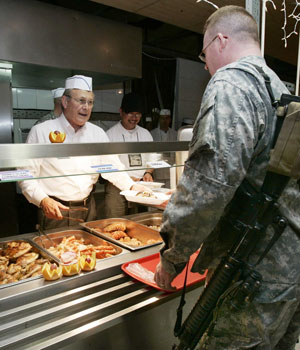
US Defense Secretary Donald Rumsfeld (L) serves Christmas dinner to soldiers in Mosul 24 December 2005 (AFP)
MOSUL, Iraq, (Reuters) – Defense Secretary Donald Rumsfeld left Iraq on Christmas Eve confident that his cautious strategy to hand over security responsibilities to Iraqi forces — a critical component for eventually declaring victory – was working so far.
The unannounced two-day visit ending on Saturday, which followed stops in Pakistan and Afghanistan, was considered a "stock-taking mission" that had been planned for months with the intention of capitalizing on Iraq””s relatively peaceful Dec. 15 parliamentary election.
In public pronouncements and private meetings, Rumsfeld showed he clearly believes that the Iraq war has entered a new phase in which the U.S. role is shifting from occupier to supporter of Iraqi forces assuming control of their nation””s security.
He was careful to avoid any prediction or timetable for a U.S. withdrawal. Asked by a soldier how he would define victory, Rumsfeld calmly replied: "a situation where the political process is successful, where security forces are sufficiently competent to take over the security responsibilities."
The strategy in place amounts to a delicate balancing act in which U.S. forces slowly hand over security responsibilities to Iraqi forces they are training, while at the same time increasing logistical and intelligence support.
It was the first time that Rumsfeld has stayed overnight in Iraq since the war began, visiting U.S. troops at bases around the country under heavy military escort and staying at one of Saddam””s former luxury resorts near Baghdad. Extra security, including decoys, was provided for his last stop in Mosul for a Christmas Eve meal with the troops in one of Iraq””s most volatile cities.
Rumsfeld played host, serving lobster tails and steak to troops who waited in line, and posing for photographs. In a speech later, he thanked them for their service, his voice choking up at times.
The trip was highlighted by Rumsfeld””s announcement a day after he arrived in Iraq that the U.S. would not deploy 7,000 combat troops from two brigades – one currently in Kuwait and the other in the United States – that would scale down troop numbers from around 138,000 over the past year to around 130,000.
"The size and composition of U.S. forces will fluctuate as commanders continue to shift focus to emphasize supporting and training the Iraqi security forces," he told U.S. troops in Falluja, where he made the announcement.
Officials traveling with him insisted on calling the strategy a "cautiously optimistic adjustment" that marked the start of the next phase of Iraq””s transition to self-rule. Some officials believe if progress continues on the security, political and economic front, U.S. forces could be below 100,000 within the next six months.
””NOT A CONVENTIONAL WAR””
The U.S. commander in Iraq, Gen. George Casey, said he would likely make further adjustments after a spring evaluation that would consider whether Iraq””s new military can handle further responsibilities.
"This is not a conventional war," he said. "In this type of war we””re fighting, more is not necessarily better and in fact in Iraq less coalition at this point in time is better because it doesn””t leave the notion of occupation, it doesn””t court the culture of dependency," he said in an interview with reporters.
He cited Iraqi soldiers, backed by U.S. troops, deployed near the border with Syria to disrupt a supply network for insurgents, saying they had managed to reduce the trafficking significantly.
Sounding more like a diplomat than a defense secretary, Rumsfeld emphasized the need for an all-inclusive government that would govern from the center and would appoint competent people to run the ministries of defense, interior, finance, and planning.
Despite elections, Iraq remains wracked by violence and is threatened by political instability rooted in deep divisions among its main religious and ethnic groups.
At every chance, Rumsfeld emphasized that the new government should recognize it needs the support of the international community, including the United Nations, International Monetary Fund and World Bank.
"I would suggest that the kinds of things other nations would be looking for would be that the new government govern from the center and be inclusive; that given the security situation in this country the new government and new ministers be people who are competent of governing in a difficult environment; and that there be a clear opposition to corruption," he added.

An Iraqi Christian woman lights a candle during a prayer at the Marry church in the Karrada district, central Baghdad, on Saturday, 24 December 2005 as Iraqi Christians celebrate on Christmas Eve (EPA)

US Defense Secretary Donald Rumsfeld spends Christmas Eve with soldiers in Mosul 24 December 2005 (AFP)
